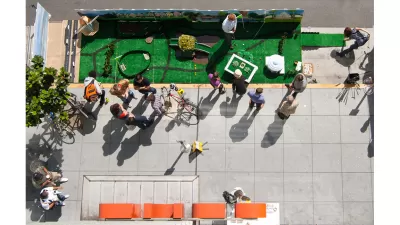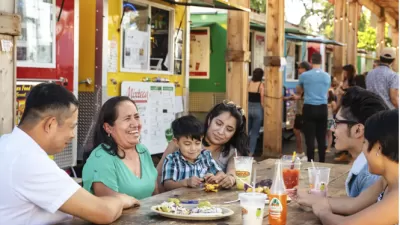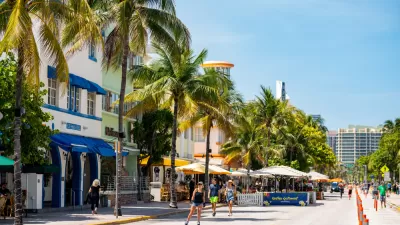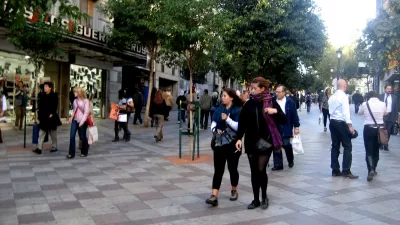COVID-19 restrictions have highlighted the importance of abundant, multi-use open spaces accessible to all.

Of the many profound changes experienced by cities in 2020, writes John King, the most meaningful might be the "realization of the importance of public space in all its forms, as well as heightened expectations of what such spaces should provide." From public seating to pocket parks to vast open spaces, the restrictions on indoor(and many outdoor) activities highlighted the need for safe, accessible, and abundant public spaces.
"In a July survey conducted by the East Bay Regional Parks District, more than 20% of the respondents said they visit one of the district’s 73 parks 'weekly,' four times the amount recorded in 2019." Public spaces also took on unexpected uses, including parking lots transformed into dining spaces, vacant lots turned into COVID-19 testing sites, and parks used to distribute free food and necessities. Phil Ginsburg, general manager of San Francisco’s Recreation and Park Department, told the San Francisco Chronicle, "parks are not luxuries or sweet amenities — they’re essential infrastructure."
But some warn against "knee-jerk" reactions from city planners and officials who assume, for example, that restrictions on cars are "an absolute good." Oakland's Slow Streets program received such criticism for its expedited implementation and lack of adequate public outreach. Oakland architect June Grant argues that plans must be made at the neighborhood level, where local users know how they use their local roads and public spaces. Ryan Russo, director of Oakland’s Department of Transportation, admits that the city's policies have often failed to reflect the experiences of underrepresented communities. "It’s too easy to listen to voices that reflect your own experiences. We need to stay in conversation with the community."
FULL STORY: As we kept space from one another, our public spaces revealed their new uses

Maui's Vacation Rental Debate Turns Ugly
Verbal attacks, misinformation campaigns and fistfights plague a high-stakes debate to convert thousands of vacation rentals into long-term housing.

Planetizen Federal Action Tracker
A weekly monitor of how Trump’s orders and actions are impacting planners and planning in America.

San Francisco Suspends Traffic Calming Amidst Record Deaths
Citing “a challenging fiscal landscape,” the city will cease the program on the heels of 42 traffic deaths, including 24 pedestrians.

Adaptive Reuse Will Create Housing in a Suburban Texas Strip Mall
A developer is reimagining a strip mall property as a mixed-use complex with housing and retail.

Study: Anti-Homelessness Laws Don’t Work
Research shows that punitive measures that criminalized unhoused people don’t help reduce homelessness.

In U.S., Urban Gondolas Face Uphill Battle
Cities in Latin America and Europe have embraced aerial transitways — AKA gondolas — as sustainable, convenient urban transport, especially in tricky geographies. American cities have yet to catch up.
Urban Design for Planners 1: Software Tools
This six-course series explores essential urban design concepts using open source software and equips planners with the tools they need to participate fully in the urban design process.
Planning for Universal Design
Learn the tools for implementing Universal Design in planning regulations.
Heyer Gruel & Associates PA
JM Goldson LLC
Custer County Colorado
City of Camden Redevelopment Agency
City of Astoria
Transportation Research & Education Center (TREC) at Portland State University
Jefferson Parish Government
Camden Redevelopment Agency
City of Claremont





























